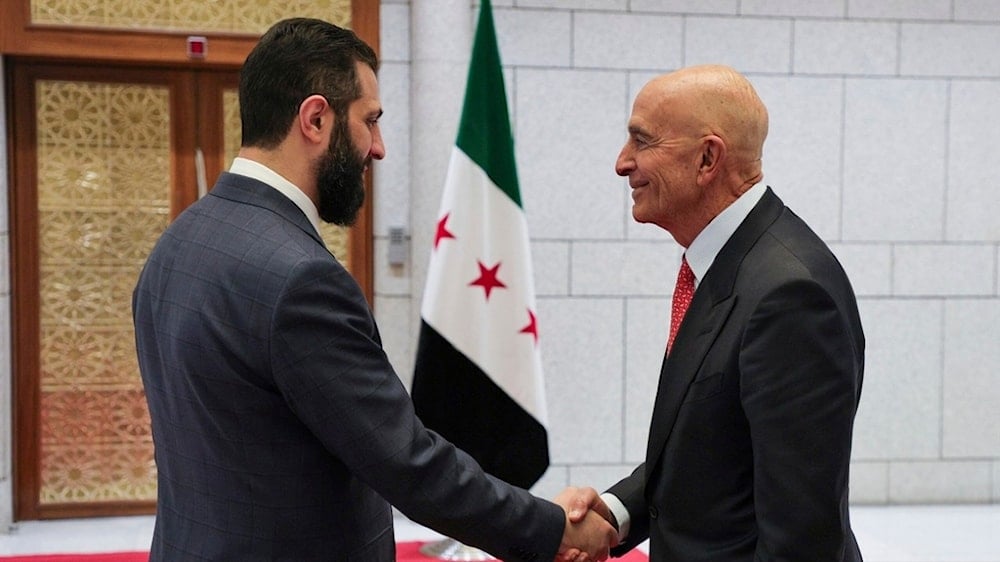Syrian-Israeli normalization 'very possible’, Trump allies say
Israeli-allied Rev. Johnnie Moore and Rabbi Abraham Cooper met Syrian President Ahmad al-Sharaa, hinting at a possible normalization deal between the Israeli regime and Syria despite the war on Gaza.
-

In this photo released by the Syrian official news agency SANA, Syria's interim President Ahmad al-Sharaa, left, shakes hands with US Ambassador to Turkey and Special Envoy to Syria Tom Barrack, in Damascus, Syria, May 29, 2025. (SANA)
A normalization agreement between Syria and the Israeli regime is “very possible,” according to Rev. Johnnie Moore, a Trump-aligned evangelical Christian pastor, following a rare meeting with Syrian interim President Ahmad al-Sharaa earlier this week. Moore and Rabbi Abraham Cooper of the Simon Wiesenthal Center visited the presidential palace in Damascus for talks with al-Sharaa on Monday, Reuters reported.
While the visit was not officially aimed at exploring normalization with the Israeli occupation, the issue was raised during their discussion, Moore confirmed in a phone interview with Reuters on Tuesday.
“I think peace is very possible, if not probable, but the first priority has to be Syria focusing on Syria,” Moore said, noting that al-Sharaa “articulated issues of concern he has, but also the potential for a very positive future.”
Syria’s de facto leadership has quickly pursued diplomatic outreach abroad following the ouster of former President Bashar al-Assad. Nonetheless, internal frictions persist with Syria’s religious minorities, and the relationship with the Israeli regime remains fraught.
Architects of 'Abraham Accords'
Rabbi Cooper and Moore's prior visits to Bahrain and the UAE are viewed by some analysts as laying the groundwork for the "Abraham Accords", the US-brokered deals which normalized ties between the Israeli regime and several Arab nations in 2020.
However, efforts to expand those agreements have largely stalled amid global condemnation of the Israeli occupation’s genocide in Gaza, which has killed over 50,000 Palestinians since October 7, 2023, according to humanitarian groups.
Despite this, Syria’s interim leadership has signaled openness to eventual detente with the Israeli occupation. “The Syrian president is what in Silicon Valley is called a unicorn; he's one of a kind,” Moore said, describing al-Sharaa as a leader capable of advancing an agenda of normalization with the Israeli regime. “There is now a window of opportunity to bring about a more positive state of affairs... though that doesn't minimize the scale of the task ahead,” he added.
UN condemnations
Moore was recently appointed executive chairman of the Gaza Humanitarian Foundation (GHF), a controversial US-backed initiative that provides aid to Palestinians in Gaza through private American logistics firms. The United Nations has criticized the initiative for bypassing traditional humanitarian coordination channels. Moore told Reuters that he did not discuss the GHF with al-Sharaa during the meeting.
Instead, Moore and Cooper proposed joint humanitarian programs with the Syrian government aimed at “tearing down stereotypes” and fostering grassroots goodwill. Specific details were withheld.
Ties between Syria and the Israeli regime remain tense. Initially, Israeli officials labeled Syria’s new rulers as “terrorists” due to their affiliations with al-Qaeda, and launched a wave of airstrikes that only seemed to stop in mid-May after a dramatic shift in US foreign policy. That shift came when Donald Trump lifted long-standing US sanctions on Syria and met with al-Sharaa in Riyadh.
Following their meeting, Trump claimed that al-Sharaa had agreed in principle to pursue normalization with “Israel,” though no timeline was established.
Al-Sharaa seeks cooperation with 'Israel'
Al-Sharaa previously claimed that Syria and the Israeli occupation "have common enemies" as he called for an end to what he called "tit-for-tat bombings" and stressed the need for regional stability through cooperation.
"The era of endless tit-for-tat bombings must end. No nation prospers when its skies are filled with fear. The reality is, we have common enemies, and we can play a major role in regional security," al-Sharaa said, in reference to "Israel", during an interview for the Jewish Journal.
Furthermore, he expressed his desire to return to the 1974 disengagement agreement between Syria and "Israel", not merely as a ceasefire line but as a platform for "mutual restraint and civilian protection," claiming that this framework could ensure safety, particularly for the Druze communities in southern Syria and the occupied Syrian Golan Heights.
This came amid multiple reports about direct Syrian-Israeli engagement, despite continued Israeli aggression and violations in Syria.

 4 Min Read
4 Min Read









